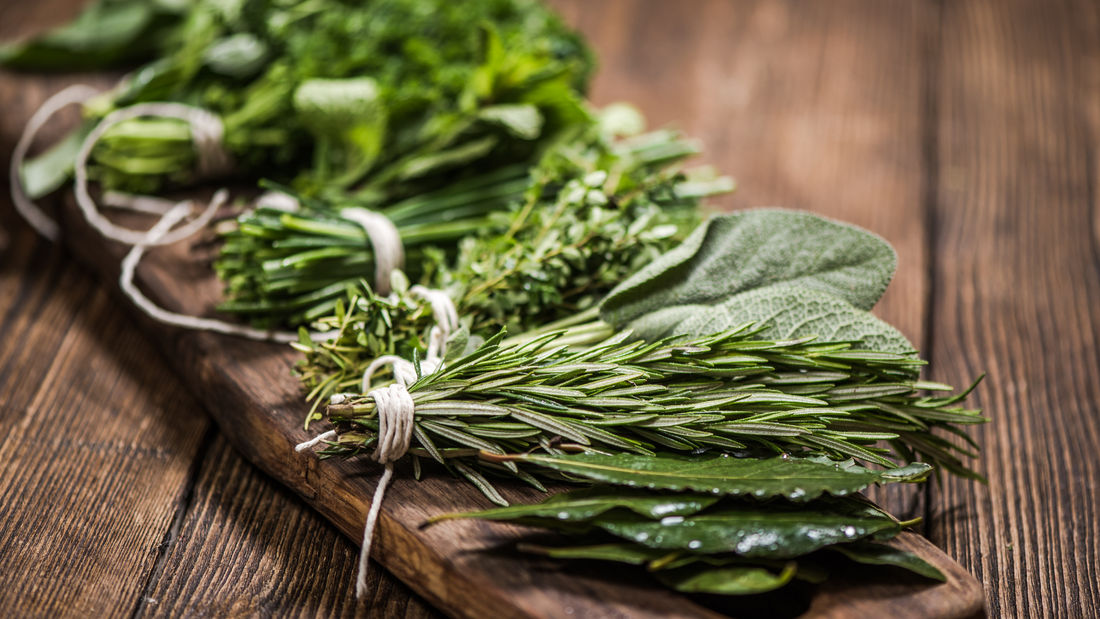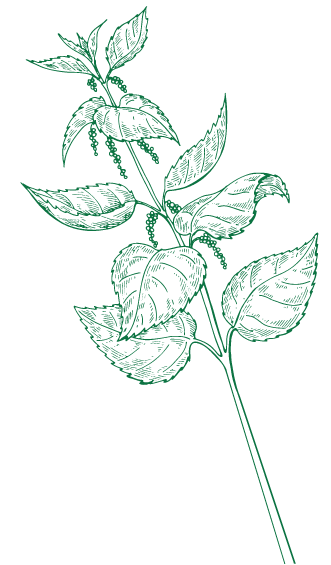Digestive herbs full of bioactive substances
Herbs are rich in aromatic compounds that add flavor to your food. They are not only flavorful but also highly nutritious. Herbs are packed with vitamins, minerals, and bioactive compounds that serve as essential building blocks for enzymes. Moreover, herbs are known for their high concentration of antioxidants. As a result, herbs play a significant role in vital body processes such as digestion and metabolism.
The benefit of fermented herbs
Similar to food, supplements, and herbs can also undergo fermentation. This practice is becoming increasingly popular, and for good reason. Through fermentation, the naturally occurring phytochemicals in herbs, for instance, become more bioavailable, allowing for better absorption by your body. This enhances the benefits derived from the various beneficial substances present in the herbs.
The natural force in 7M
Herbs have been carefully selected for 7M based on their pleasant taste and their beneficial contribution to digestion, bowel function, liver function, and kidney function. These herbs are well-known in phytotherapy as well as in everyday culinary use. This ensures that 7M can be used safely. The herbs in 7M undergo fermentation, which enhances the availability of favorable nutrients. Each herb in 7M offers various health benefits. Let's introduce you to the 10 powerful herbs in 7M for your inner ecosystem:
Fennel
Fennel - Foeniculum vulgare - is rich in vitamins B1, B2, B6, folic acid, and E, and contains iron.Fennel supports digestion and intestinal function*
Anise
Anise - Pimpinella anisum - is also a plant from the umbellifer family. Both the seeds and the leaf are used in cooking or as a spice. Anise contains vitamins B1, B2, B3, B5, folic acid and C and the minerals iron, copper, calcium, phosphorus, magnesium and potassium. Anise soothes your airways and supports your digestion*.
Peppermint
Peppermint - Mentha x piperita - is a plant from the lipflower family. Oil is extracted from the leaves of peppermint and used as a tea. Peppermint contains vitamin A and several B vitamins, as well as phosphorus, iron, flavonoids, potassium and calcium. Peppermint is good for your stomach*.
Thyme
Thyme - Thymus vulgaris - is also a plant from the lipflower family. Thyme has a very aromatic scent and is widely used as a spice in Mediterranean cuisine. Thyme contains vitamins B2, B6, folic acid, C and beta-carotene, and the minerals iron, calcium and magnesium. Thyme is rich in antioxidants* and soothes your airways*.
Oregano
Oregano - Origanum vulgare - or 'wild marjoram' also belongs to the lip flower family. Oregano is known from Italian and Greek cuisine. It contains vitamins A and B1, potassium, calcium and phosphorus. Oregano is an antioxidant and helps protect healthy cells and tissues*.
Artichoke
Artichoke - Cynara scolymus - is a plant whose flower bud is edible as a vegetable. The leaves are used as a spice. Artichoke contains many vitamins, such as vitamin A, several B vitamins and vitamins C and K, and the minerals iron, magnesium, phosphorus, manganese, zinc and calcium. Artichoke is a powerful antioxidant*, it supports your digestion and your intestinal, liver and kidney function, and it contributes to normal fat levels in your blood*.
Nettle
Nettle - Urtica dioica - was already used as a food before our current era. Nettle is rich in vitamins A, C, E and K as well as calcium and iodine. Nettle tea is made from the leaves. Nettle supports your kidney function and urinary tract*, it is good for the heart and blood vessels* and purifies your skin*.
Cumin
Cumin - Cuminum cyminum - is also a plant from the umbellifer family. Mainly the seeds of the plant are used. The herb has a light nutty taste. Cumin contains a lot of vitamin E and the minerals iron, manganese, magnesium and calcium.
Camomile
The flowers of the chamomile plant – Matricaria chamomilla – are used. Tea is made from them and they are used as a spice. Chamomile contains vitamins A, B and C. Chamomile supports, among other things, your digestion and your fat metabolism, it soothes your airways*, it has a relaxing effect and supports your immune system*.
Fenugreek
Fenugreek - Trigonella foenum-graecum - is a plant of the legume family. The plant is also called Greek hay, and is used as a kitchen herb and in tea. Fenugreek contains fiber, protein, vitamins B1, B2, B3, B6, folic acid and C, and the minerals calcium, phosphorus, potassium, copper, magnesium, iron and zinc.
*These health claims are pending approval by the European Commission.
In summary, 7M not only offers a flavorful and healthy drink but also provides versatile support for various aspects of your body, particularly digestion.







